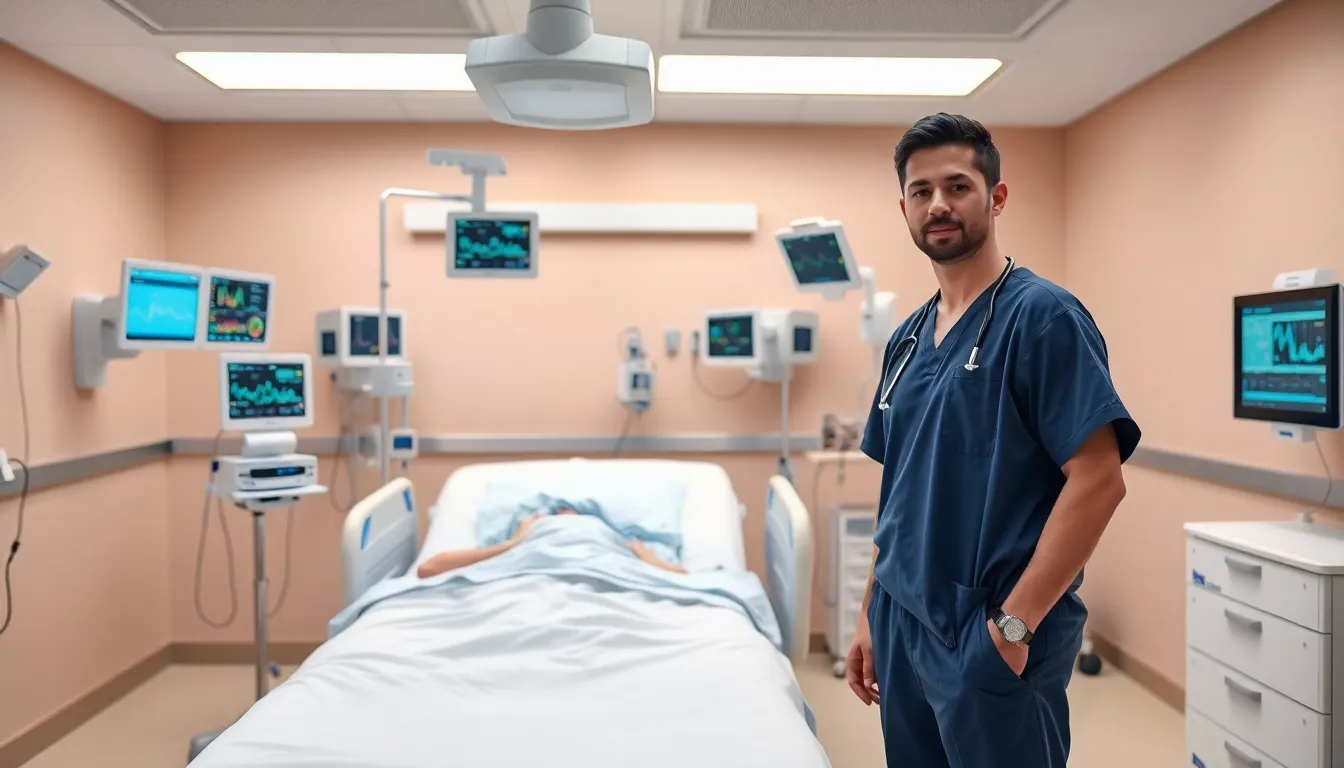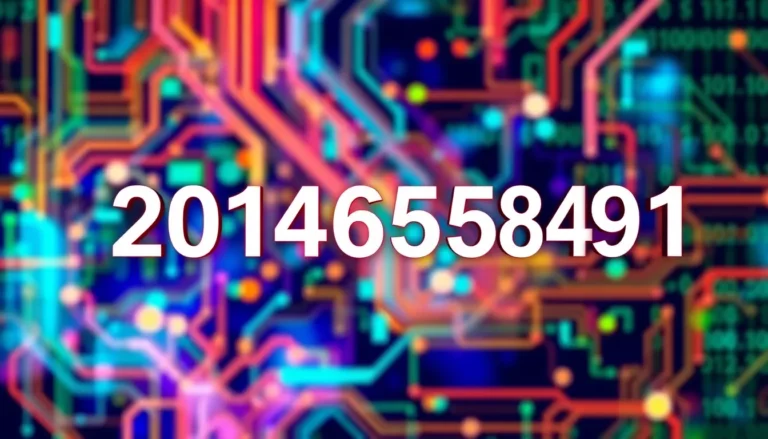Imagine a world where your doctor knows you better than you know yourself—thanks to your smart fridge and that fitness tracker you thought was just a trendy accessory. The Internet of Things (IoT) in healthcare is transforming how we approach wellness, making it smarter, faster, and maybe a little too nosy. From wearable devices that monitor vital signs to smart beds that adjust to your sleeping position, IoT is revolutionizing patient care and health management.
With IoT, healthcare isn’t just about hospital visits and bulky machines anymore. It’s about convenience, efficiency, and a sprinkle of tech magic that keeps you connected to your health 24/7. As devices communicate seamlessly, they empower both patients and providers, paving the way for a healthier future. Get ready to explore how these innovations are not just changing the game but rewriting the entire playbook in healthcare.
Table of Contents
ToggleOverview of Internet of Things in Healthcare
The Internet of Things (IoT) revolutionizes healthcare by interconnecting devices, enabling real-time data transfer and analysis. Smart devices, such as wearables, monitor vital signs continuously; they provide healthcare providers with crucial information instantly. IoT applications track health metrics like heart rate, glucose levels, and activity patterns, allowing for personalized care.
Numerous healthcare facilities implement IoT technology to streamline operations and improve resource management. Remote patient monitoring systems enhance accessibility, allowing patients to receive care from home. Communication between medical devices simplifies data sharing, reducing the risk of errors during treatment.
Hospitals utilize IoT devices to reduce operational costs and improve patient outcomes. Smart beds monitor patient movement and alert staff when assistance is needed, ensuring optimal care. Additionally, IoT-enabled imaging devices enhance diagnostic capabilities, allowing for faster and more accurate assessments.
The integration of IoT into healthcare promotes proactive intervention. With predictive analytics, healthcare providers identify potential health issues before they escalate. This proactive approach minimizes hospital readmissions and improves overall patient satisfaction.
Data security remains a critical concern as IoT adoption increases. Encrypting patient data and implementing robust cybersecurity measures ensure compliance with regulations while protecting sensitive information. Despite challenges, the benefits of IoT in healthcare significantly outweigh potential risks.
Innovative companies within the healthcare sector frequently explore new IoT solutions, aiming to enhance patient experiences and outcomes further. The continuous evolution of IoT technology promises even greater advancements in healthcare delivery and management, solidifying its role in the future of medical care.
Key Components of IoT in Healthcare

The Internet of Things significantly enhances healthcare through various components that improve patient management. Two primary elements include wearable devices and smart medical equipment.
Wearable Devices
Smartwatches and fitness trackers monitor vital signs like heart rate and activity levels. Data collected by these devices allows healthcare providers to offer personalized care plans tailored to individual needs. Continuous monitoring informs early detection of potential health issues, which ultimately leads to proactive interventions. Patients benefit from improved health outcomes through regular feedback and goal tracking. According to a study by the Healthcare Information and Management Systems Society, wearable technology can reduce hospital visits by up to 30 percent, reflecting its effectiveness in managing chronic conditions.
Smart Medical Equipment
Smart medical equipment plays a crucial role in modern healthcare settings. Devices like smart beds and imaging equipment gather real-time data, optimizing patient monitoring and diagnostics. Integration of IoT allows healthcare facilities to streamline operations and improve resource management. This efficiency leads to reduced wait times and enhanced patient satisfaction. The Centers for Medicare & Medicaid Services reported that hospitals adopting smart technology experienced a 15 percent improvement in patient outcomes. Leveraging smart medical devices fosters a more connected experience, benefiting both patients and providers alike.
Benefits of Internet of Things in Healthcare
The Internet of Things significantly enhances various aspects of healthcare. Healthcare professionals and patients reap numerous benefits from connected devices and smart technologies.
Improved Patient Monitoring
Smart wearables facilitate continuous patient monitoring. Devices like smartwatches and fitness trackers consistently track vital signs, allowing healthcare providers to access real-time data. Timely intervention becomes possible when abnormalities are detected. Consequently, patients experience quicker care adjustments, which improves overall health management. Nurses and doctors utilize this data to create personalized care plans, contributing to better patient outcomes. Reductions in hospital visits by up to 30 percent exemplify the importance of early detection in healthcare.
Enhanced Data Management
Data management improves with IoT technology in healthcare settings. Connected devices gather vast amounts of data, enabling seamless integration into healthcare systems. This integration leads to better data analysis and more informed decision-making. Hospitals use smart medical equipment that automatically records patient information, which reduces human error. Efficient data management fosters better communication among healthcare team members. As a result, patients benefit from more coordinated and effective care. Notably, predictive analytics identify potential health issues before they escalate, further enhancing patient safety and reducing readmission rates.
Challenges and Considerations
Challenges associated with integrating IoT in healthcare include security concerns and interoperability issues. Addressing these challenges is critical for maximizing the benefits of IoT technology.
Security Concerns
Data security represents a significant issue in IoT healthcare applications. Hackers can exploit vulnerabilities in connected devices, potentially leading to unauthorized access to sensitive patient information. Protecting personal health data is essential, as breaches can result in severe legal and financial repercussions. To mitigate these risks, healthcare organizations often deploy advanced encryption methods and strict access controls. Regular software updates also play a vital role in securing IoT devices against emerging threats. Implementing robust cybersecurity protocols allows healthcare providers to safeguard patient information effectively.
Interoperability Issues
Interoperability challenges complicate the seamless integration of diverse IoT devices in healthcare. Devices from different manufacturers often lack standardized communication protocols, making data sharing difficult. Without interoperability, healthcare providers struggle to consolidate data from various sources efficiently. This limitation can hinder patient care and reduce the overall effectiveness of IoT systems. Embracing standardized frameworks can facilitate smoother integration and enhance communication among devices. Healthcare organizations prioritize initiatives that support interoperability to improve data exchange, ensuring comprehensive patient monitoring and streamlined workflows.
Future Trends in IoT Healthcare
Innovative applications of IoT in healthcare are continuously emerging. Remote patient monitoring technology is set to grow significantly as more individuals prefer home health management. Real-time data analytics will enhance the ability to tailor personalized treatment plans, therefore boosting patient outcomes.
Additionally, smart wearable devices are evolving with advanced biometric tracking. Sensors in these wearables will monitor vital signs and other health metrics, enabling proactive healthcare interventions. Enhanced integration of artificial intelligence in IoT devices allows for improved predictive analytics, helping to identify potential health issues early.
Healthcare facilities increasingly adopt IoT to streamline operations. Automation in hospital management, such as smart beds and medical devices, improves resource allocation and patient flow. This shift enhances operational efficiency and patient satisfaction.
Cybersecurity solutions will grow in importance as the use of IoT expands. Advanced encryption and secure data protocols ensure the protection of sensitive health information. Healthcare organizations emphasize creating robust security frameworks to address potential vulnerabilities.
Interoperability between various devices remains a challenge. Standardized communication protocols will facilitate seamless data exchanges among connected systems. Progress in this area is crucial to creating comprehensive patient monitoring solutions.
Patient engagement will also rise through IoT applications. Mobile health apps empower individuals to take charge of their health, integrating seamlessly with wearables for improved health management. Consequently, IoT will foster a more proactive and personalized approach to healthcare.
Overall, future trends in IoT healthcare focus on enhancing connectivity, security, and patient-centered solutions. The continued evolution of technology promises to transform healthcare landscapes further, making it more efficient and responsive to patient needs.
The Internet of Things is reshaping healthcare by promoting a more connected and efficient approach to patient care. With smart devices enabling continuous monitoring and real-time data sharing, healthcare providers can deliver personalized interventions that enhance patient outcomes.
As IoT technology evolves, it will continue to streamline operations and improve resource management within healthcare facilities. While challenges like data security and interoperability persist, the ongoing development of robust solutions will address these concerns.
The future of IoT in healthcare is bright, with advancements in remote monitoring, predictive analytics, and patient engagement driving a more proactive approach to health management. This transformation not only empowers patients but also fosters a more effective healthcare system overall.



